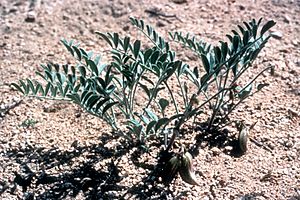Walker Pass milkvetch facts for kids
Quick facts for kids Walker Pass milkvetch |
|
|---|---|
 |
|
| Conservation status | |
| Scientific classification |
|
| Kingdom: | Plantae |
| Clade: | Tracheophytes |
| Clade: | Angiosperms |
| Clade: | Eudicots |
| Clade: | Rosids |
| Order: | Fabales |
| Family: | Fabaceae |
| Genus: | Astragalus |
| Species: |
A. ertterae
|
| Binomial name | |
| Astragalus ertterae Barneby & Shevock
|
|
| Script error: The function "autoWithCaption" does not exist. | |
Script error: No such module "Check for conflicting parameters".
The Walker Pass milkvetch (Astragalus ertterae) is a very rare wild plant. It's a type of milkvetch, which belongs to the large pea family. This special plant only grows in a small area near Walker Pass in the Sierra Nevada mountains of California. It is considered one of the rarest plants in the state.
What it Looks Like
The Walker Pass milkvetch is a small plant that grows year after year. It has a hairy stem that is usually less than 10 centimeters (about 4 inches) long. Much of its stem actually grows underground!
This plant has about 4 or 5 leaves. Each leaf is a few centimeters long and is made up of several small, oval-shaped leaflets.
When it blooms, the plant produces a cluster of up to 17 cream-colored flowers. Each flower is about one centimeter (less than half an inch) long. After the flowers, it grows a fruit that looks like a swollen, hairless pod. This pod dries out and becomes leathery.
Where it Lives
The Walker Pass milkvetch is found only in California. This means it is endemic to California. Specifically, it grows in a very small area near Walker Pass in the Sierra Nevada mountain range. Scientists have only found three places where this plant grows naturally.
Why it's Special
This plant is very rare, which makes it important to protect. Its rarity is why it's listed with a "G1" status by The Nature Conservancy (TNC). This means it is "critically imperiled" globally. In simple terms, it's at very high risk of disappearing forever. Protecting its habitat is key to helping this unique plant survive.
See also
 In Spanish: Astragalus ertterae para niños
In Spanish: Astragalus ertterae para niños
 | Precious Adams |
 | Lauren Anderson |
 | Janet Collins |


